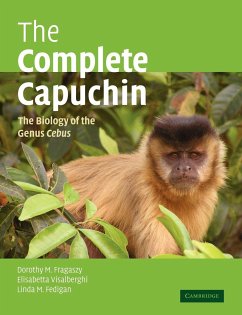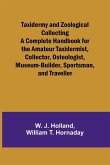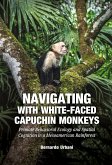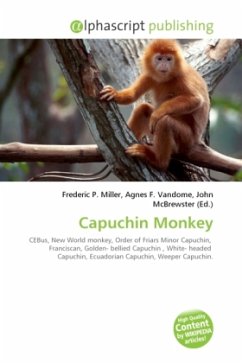Short description/annotation
Explores the complex nature of capuchins both in the wild and in captivity.
Main description
Capuchin monkeys are one of the most widely distributed genera of primates in Central and South America. Capuchins captivate the imagination of scientists and the lay public alike with their creative and highly variable behavior, their grace and power in action, and their highly developed social character. In this, the first scholarly book devoted to the biology of the genus Cebus (Primates: Platyrrhine), the taxonomy, distribution, life history, ecology, anatomy, development, perception, cognition, motor skills, social and sexual behavior of these monkeys are summarized. The book also describes how humans have viewed, used and studied these monkeys from ancient times to the present. The authors explicitly organismic and inclusive treatment provides a picture in unparalleled detail of the capuchin over its lifetime for all those with an interest in these fascinating animals.
Table of contents:
Preface; Acknowledgments; Prologue; Colour plates; Part I. Capuchins in Nature: 1. Taxonomy and distribution with Anthony Rylands; 2. Behavioral ecology; 3. Community ecology; 4. Life history and demography; Part II. Behavioral Biology: 5. The body; 6. Development; 7. Motor skills; Part III. Behavioral Psychology: 8. Perceiving the world: memory and perception; 9. Engaging the world: exploration and problem-solving; 10. Fancy manipulators; 11. Living together; 12. Erotic artists; 13. Learning together; Epilogue: The (in)complete capuchin; References; Appendices: I. Foods eaten; II. Field sites; III. Hematological and physiological values; IV. Brief list of management references.
Hinweis: Dieser Artikel kann nur an eine deutsche Lieferadresse ausgeliefert werden.
Explores the complex nature of capuchins both in the wild and in captivity.
Main description
Capuchin monkeys are one of the most widely distributed genera of primates in Central and South America. Capuchins captivate the imagination of scientists and the lay public alike with their creative and highly variable behavior, their grace and power in action, and their highly developed social character. In this, the first scholarly book devoted to the biology of the genus Cebus (Primates: Platyrrhine), the taxonomy, distribution, life history, ecology, anatomy, development, perception, cognition, motor skills, social and sexual behavior of these monkeys are summarized. The book also describes how humans have viewed, used and studied these monkeys from ancient times to the present. The authors explicitly organismic and inclusive treatment provides a picture in unparalleled detail of the capuchin over its lifetime for all those with an interest in these fascinating animals.
Table of contents:
Preface; Acknowledgments; Prologue; Colour plates; Part I. Capuchins in Nature: 1. Taxonomy and distribution with Anthony Rylands; 2. Behavioral ecology; 3. Community ecology; 4. Life history and demography; Part II. Behavioral Biology: 5. The body; 6. Development; 7. Motor skills; Part III. Behavioral Psychology: 8. Perceiving the world: memory and perception; 9. Engaging the world: exploration and problem-solving; 10. Fancy manipulators; 11. Living together; 12. Erotic artists; 13. Learning together; Epilogue: The (in)complete capuchin; References; Appendices: I. Foods eaten; II. Field sites; III. Hematological and physiological values; IV. Brief list of management references.
Hinweis: Dieser Artikel kann nur an eine deutsche Lieferadresse ausgeliefert werden.








